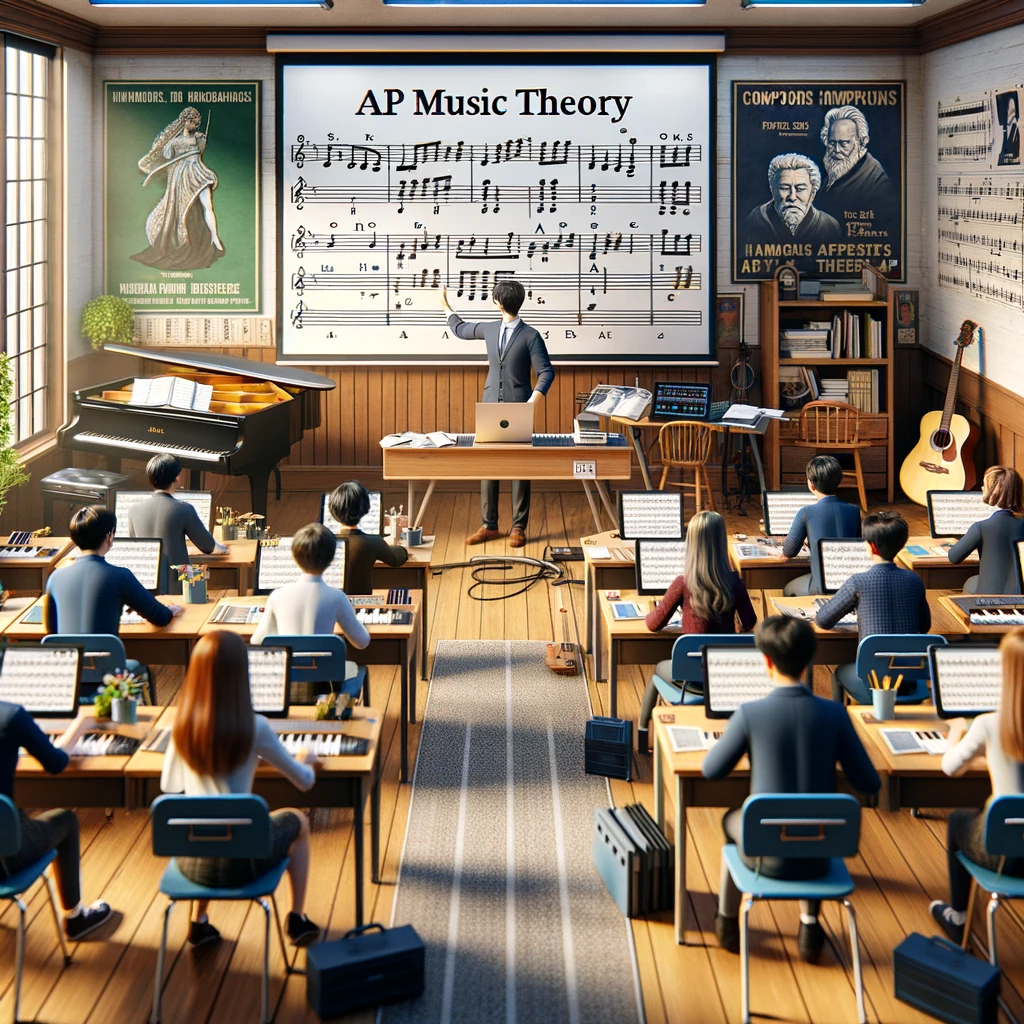AP Music Theory is an in-depth exploration of the building blocks of music. You’ll learn to recognize, understand, and describe the fundamental materials and processes of music, honing your skills through listening, reading, writing, and performing a wide variety of musical pieces.
Skills Development
In AP Music Theory, you’ll develop a range of musical skills, including:
- Musical Analysis: Identifying features of pitch, intervals, scales, chords, meter, rhythm, and other musical concepts.
- Sight-Singing: Singing a notated melody on sight, enhancing your aural skills.
- Transcription: Notating music that you hear, developing your ear for music.
- Composition: Completing music based on cues, following common-practice style, and creating original compositions.
Equivalency and Prerequisites
- College Course Equivalent: Comparable to a one- or two-semester college introductory music theory course.
- Recommended Prerequisites: Ability to read and write musical notation and basic performance skills on voice or an instrument.
Exam Information
- Exam Date: Wednesday, May 15, 2024, at 12 PM Local Time.
- This is the scheduled date for the AP Music Theory Exam.
Course Units
The AP Music Theory curriculum is organized into eight units:
Unit 1: Music Fundamentals I
- Focus: Pitch, major scales and key signatures, rhythm, meter, and expressive elements.
- Exam Weight: 12%–15%.
Unit 2: Music Fundamentals II
- Focus: Minor scales and key signatures, melody, timbre, and texture.
- Exam Weight: 20%–25%.
Unit 3: Music Fundamentals III
- Focus: Triads and seventh chords.
- Exam Weight: 22%–25%.
Unit 4: Harmony and Voice Leading I
- Focus: Chord function, cadence, and phrase.
- Exam Weight: 15%–22%.
Unit 5: Harmony and Voice Leading II
- Focus: Chord progressions and predominant function.
- Exam Weight: 10%–13%.
Unit 6: Harmony and Voice Leading III
- Focus: Embellishments, motives, and melodic devices.
- Exam Weight: 10%–13%.
Unit 7: Harmony and Voice Leading IV
- Focus: Secondary function.
- Exam Weight: 8%–13%.
Unit 8: Modes and Form
- Focus: Modes, phrase relationships, and forms.
- Exam Weight: 8%–10%.
Preparing for Musical Mastery
To excel in AP Music Theory, immerse yourself in the study of music, engage in active listening and analysis, and apply your knowledge to performance and composition. Let the music guide you to a deeper understanding of its theory and beauty! 🎼🎶✨
Why Take AP Music Theory?
Taking AP Music Theory can be incredibly beneficial for students with a passion for music, whether you’re a performer, composer, or simply enjoy understanding the mechanics of music. Here are some reasons to consider taking the course:
Deepen Musical Knowledge:
- Gain a thorough understanding of the fundamental components of music, including harmony, melody, rhythm, and form.
Develop Aural Skills:
- Improve your ability to recognize and understand musical structures and elements by ear, which is invaluable for performers and listeners alike.
Enhance Performance:
- Understanding music theory can inform your performance practice, leading to more nuanced and expressive interpretations.
Prepare for College:
- The course mirrors a college-level music theory class, potentially earning you college credit and preparing you for further music studies.
Composition and Arrangement:
- Learn the skills necessary to compose and arrange your own music, fostering creativity and self-expression.
Critical Listening:
- Develop the ability to analyze and critique music, deepening your appreciation and enjoyment of various musical genres.
Broaden Career Opportunities:
- For those considering a career in music, AP Music Theory provides foundational knowledge that is essential for many roles in the industry.
Interdisciplinary Learning:
- Music theory intersects with history, mathematics, and physics, offering a rich, interdisciplinary learning experience.
No Prerequisites:
- The course is accessible to all students with basic music reading skills and an interest in deepening their understanding of music.
Personal Fulfillment:
- Studying music theory can be personally rewarding, offering new insights into the music you love and enhancing your overall musical experience.
By taking AP Music Theory, you’re not just learning about music; you’re gaining a toolkit for understanding, creating, and appreciating music at a deeper level. 🎼🎶✨
Let’s dive into the details of the AP Music Theory Exam:
Multiple-Choice Section:
- This section assesses your knowledge of music theory concepts, listening skills, and analytical abilities.
- You’ll encounter questions related to pitch, rhythm, harmony, melody, and other musical elements.
- Approximately 75 multiple-choice questions.
- Exam Weight: Varies across different units (ranging from 4% to 25%).
Free-Response Section:
- This section evaluates your practical skills in music theory.
- You’ll complete tasks such as:
- Sight-Singing: Singing a notated melody on sight.
- Melodic Dictation: Notating music that you hear.
- Harmonic Analysis: Analyzing chord progressions.
- Composition: Creating original musical phrases based on given cues.
- Two free-response questions.
- Exam Weight: Approximately 30%.
Listening Examples:
- Throughout the exam, you’ll listen to recorded musical excerpts.
- These examples will test your ability to recognize musical elements, such as intervals, chords, and cadences.
- Be attentive to details and practice active listening.
Exam Date:
- The AP Music Theory Exam is scheduled for Wednesday, May 15, 2024, at 12 PM Local Time.
Preparation Tips:
- Review music theory concepts thoroughly.
- Practice sight-singing and melodic dictation regularly.
- Familiarize yourself with harmonic progressions and voice leading.
- Listen to a variety of musical styles to enhance your ear training.
Remember, the AP Music Theory Exam is an opportunity to showcase your understanding of music theory and practical skills. Best of luck in your preparation! 🎼📝✨







